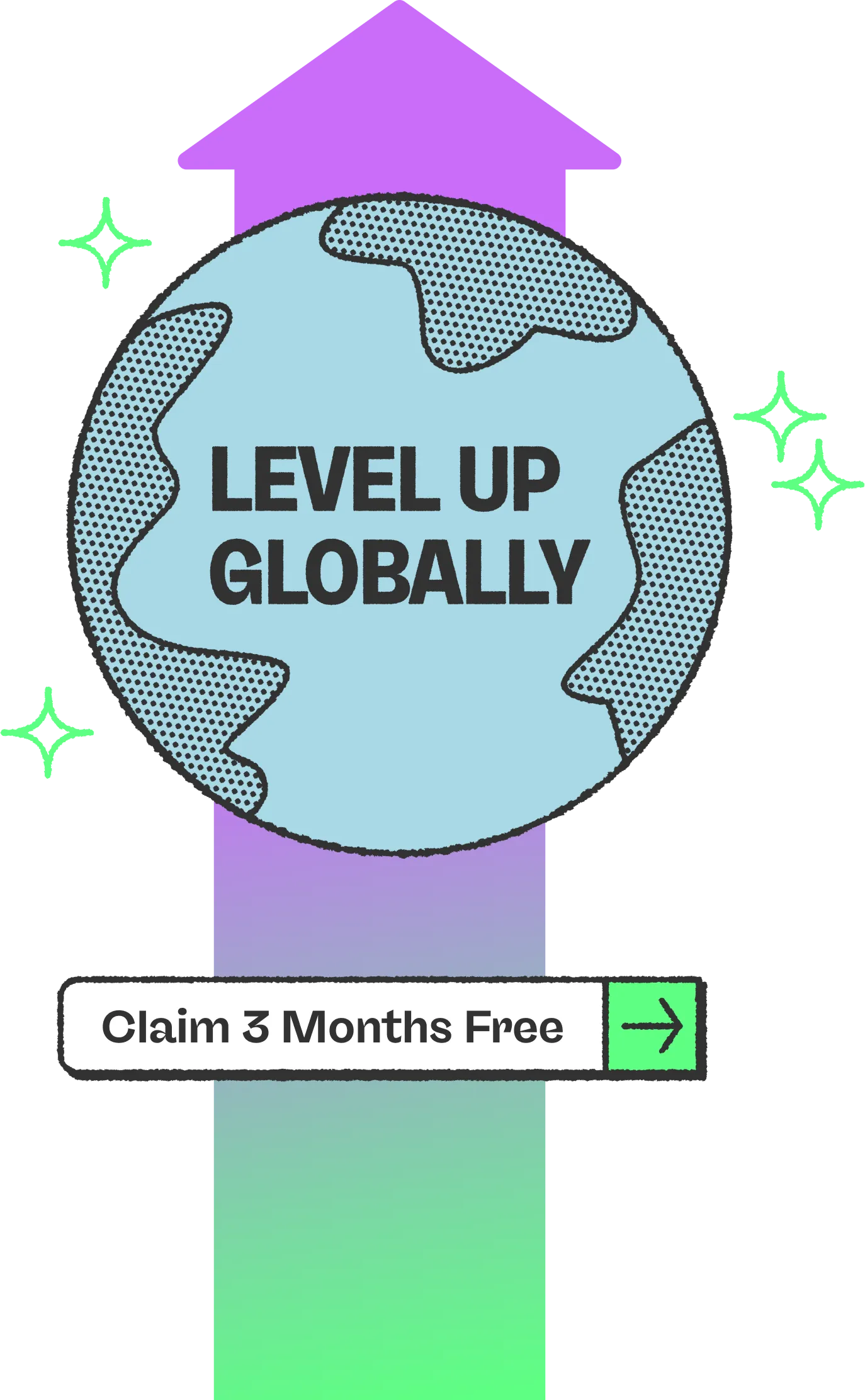Two simple words go a long way toward making an employee feel appreciated. But “thank you” shouldn’t be the only way you recognize hard work.
Verbal acknowledgment is one of many ways to make employees feel valued and cared for. Personalized Slack messages, wellness programs, and small gifts boost morale further, improving the employee experience and bolstering worker retention.
Are you ready to brainstorm employee recognition ideas? Oyster has 14 to get you started. We’ll explain how to recognize employees and why it’s a crucial soft skill for your company’s leaders.
Why is employee recognition important?
Employee recognition occurs when team members are acknowledged for their valuable qualities or outcomes (e.g., positive attitude, work ethic, or successful performance). Whenever an employee performs in an impactful way that aligns with company-wide values and goals, they should be recognized. Rewarding employees with bonuses, employee appreciation days, and other tangible benefits will encourage further dedication.
No one wants to feel like a cog in someone else’s machine. Employees want to know their hard work, personal accomplishments, and long-term commitment uniquely contribute to the company’s goals and performance. Employee appreciation gives meaning to their day-to-day tasks and motivates them to bring their A-game every day. It encourages team members to consistently deliver good work and boosts their engagement and performance.
Regular recognition boosts employee morale by cultivating a positive environment that makes everyone feel valued and appreciated. It provides an example to the entire team of the type of employee the organization cherishes. This reinforces company values and builds a welcoming and productive company culture.
4 types of employee recognition
Include these four types of acknowledgments to build a robust employee recognition program:
- Formal recognition: This type of employee recognition is built into the architecture of your employee recognition program. It involves regular action from leadership and management, such as celebrating work anniversaries, highlighting good performance on a wall of fame, or handing out company swag for successful projects. Public recognition in front of the entire team shows other employees they can receive similar recognition for hard work.
- Informal recognition: These types of recognition can occur anytime and come from any employee. They can be private or public but should be timely—sent as soon as a project or goal is completed. Examples of informal recognition include kudos in the team Slack or direct messages for a job well done.
- Leader recognition: This involves a leader or manager recognizing a direct report. For example, a manager may congratulate an employee for delivering a presentation that successfully brought on a new client.
- Peer-to-peer recognition: When colleagues recognize each other, it signals that appreciation has permeated the company culture. Employees demonstrate a positive, connected work environment when they offer public or private thanks to others for sharing advice, writing a LinkedIn recommendation, or contributing to a task.
14 of the best employee recognition ideas to inspire your team
Recognizing your employees’ hard work and dedication is essential to foster a positive and motivated team environment. Here are 14 employee recognition program examples to get started:
Leadership recognition
Outstanding leadership sets the tone for company-wide success. When you highlight exceptional leaders, you encourage the entire team to strive for greatness. These leadership recognition examples will acknowledge team members who take initiative:
- Positive feedback: Regularly highlight and celebrate team members who exemplify company values. You can point out an employee’s positive impact via team meetings, messaging channels, or handwritten notes. Be specific—note the positive action (e.g., exceeding a sales goal) and how it impacts team performance or company culture.
- Company swag: Who doesn’t want a brand-new hoodie or notebook? Company swag is a practical way to show appreciation and pride for your workplace. Plus, it motivates other team members to strive for the same goodie bags.
- Experiential rewards: Although they require a dedicated budget, experiential employee awards invite healthy competition among team members. These employee rewards can be work-related, e.g., a trip to an industry conference or free coaching sessions to polish skills, or non-professional, such as tickets to a concert or an all-expenses-paid weekend getaway.
- Give LinkedIn recommendations: Encourage coworkers, managers, and senior leadership to write meaningful LinkedIn recommendations that praise specific leadership qualities and accomplishments. These recognitions can enhance an employee’s professional reputation and visibility within the industry. In addition, hyping up your workers demonstrates a supportive and growth-oriented workplace culture.
- Offer bonus incentives: Money talks. A points-based rewards system provides financial incentives to top performers based on achievements and work performance. For some employees, compensation can help push work performance to the next level.
Company culture recognition
A positive company culture supports employee engagement and retention. Here are effective recognition strategies to reinforce a positive work environment:
- Start an employee wellness program: Develop and promote wellness initiatives that support mental, physical, and emotional balance and well-being. Resources like fitness classes, mindfulness sessions, and wellness apps encourage healthy work-life balance.
- Recognize personal achievements: Celebrate employee’s significant milestones, such as work anniversaries, certifications, or personal accomplishments. You can publicly recognize these achievements in newsletters, social media posts, or company-wide announcements.
- Invest in personal development: Offer ongoing training and development opportunities that align with employees’ career goals and aspirations. Investing in your employees demonstrates that the company cares about their long-term trajectory rather than short-term performance.
- Offer surprise time off: Additional time off is a meaningful non-monetary benefit to thank employees for their hard work. Whether it’s a half day, full day, or long weekend, the gesture allows employees to spend quality time with family, relax, or enjoy hobbies. It shows they’re more than an employee and promotes work-life balance.
- Administer employee surveys: Want to learn what makes your employees feel recognized and motivated? Ask them. Regularly solicit feedback via employee engagement surveys to gauge the efficacy of recognition efforts and pool new ideas. Employee feedback helps you develop better programs and personalize engagement strategies for individual employees.
- Include distributed workers: Remote workers often feel isolated. Send them work swag to personalize their home offices or a surprise batch of cookies on their birthday or work anniversary to make remote workers feel included, no matter the distance.
Peer-to-peer and team recognition
Encourage recognition among coworkers and create team rewards to strengthen collaboration and teamwork. These peer-to-peer recognition ideas will promote partnership and unity:
- Catered meals: If your company doesn’t offer lunch, plan an employee appreciation day with a meal. Interactive elements, such as an ice cream stand or taco bar, add fun while encouraging informal interactions and team bonding. To engage remote workers, consider sending them lunch and hosting a joint video call.
- Office outings: Trivia, bowling, and laser tag are fun ways to accommodate a diverse group of people and connect coworkers in a light-hearted, personal setting. Encourage healthy competition by offering winning teams gift cards or a personalized company trophy.
- Mentoring programs: Pair newer team members with experienced employees who can provide guidance, share knowledge, and foster professional growth. For global teams, mentorships can connect international workers and bolster their professional development.
How to implement employee recognition strategies in your team
An effective employee recognition strategy requires careful planning and communication. Follow these five steps to build your recognition program:
- Set your budget: Earmark financial resources for employee recognition initiatives. A dedicated budget prioritizes employee awards and recognitions and builds a robust, sustainable program.
- Create a schedule: Develop a timeline for implementing and executing recognition activities. This should include when to launch each initiative, how often you’ll host events, and when to announce or distribute awards. Likewise, managers and leadership should be regularly reminded to give informal recognition.
- Decide on criteria: Develop precise eligibility requirements for tangible benefits, like gift cards or a spot on the Wall of Fame. Establish nomination or selection procedures and outline how recognition will be managed. This is an excellent opportunity to conduct an employee survey to gather ideas about rewards that will authentically engage your team.
- Choose rewards: Once you have a budget and employee feedback, develop a mix of monetary (e.g., bonuses) and non-monetary (e.g., extra PTO and kudos) recognitions.
- Prepare your team: Communicate the importance of the employee reward program to managers. To ensure consistency and fairness, train them to effectively reward employees and send regular reminders to recognize good work.
Employee recognition strategies for a global workforce
Building a unified global team requires careful recognition strategies that resonate across cultures. With Oyster, you can implement a tailor-made employee recognition program that aligns with company values and makes each team member feel valued and appreciated.
Discover how Oyster’s Total Rewards can increase engagement from top talent and boost retention of star team members, no matter where they’re located.
.webp)
About Oyster
Oyster is a global employment platform designed to enable visionary HR leaders to find, engage, pay, manage, develop, and take care of a thriving distributed workforce. Oyster lets growing companies give valued international team members the experience they deserve, without the usual headaches and expense.
Oyster enables hiring anywhere in the world—with reliable, compliant payroll, and great local benefits and perks.
.avif)



.avif)

.avif)
.avif)

.avif)







